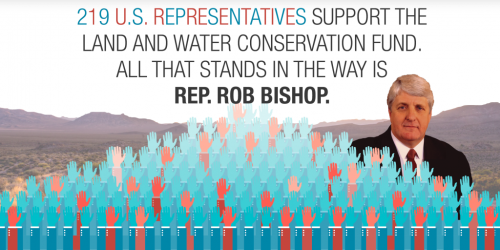A few members of Congress are about to erase a 50-year-old promise

UPDATE: Though the Land and Water Conservation Fund did expire, it was later reauthorized for three years—a hard-fought win for The Wilderness Society and our members
On Sept. 30, the Land and Water Conservation Fund (LWCF) will expire—the shameful end of a popular, effective conservation program thanks to congressional dysfunction and radical ideology.
NEWS: Land and Water Conservation Fund saved for the short term
Across both parties, political leaders have voiced their support for the Land and Water Conservation Fund—from members of Congress to governors to mayors. The program has enjoyed strong bipartisan support for 50 years.
So why hasn’t the Land and Water Conservation Fund been reauthorized yet? Because of Rep. Rop Bishop and a handful of other ideologically driven opponents of public lands protection. Rep. Bishop recently announced that he plans to kill LWCF as it currently functions, and that’s a huge loss for all Americans.
What we are losing:
The Land and Water Conservation Fund, which was signed into law in 1964, is a visionary idea that has helped protect millions of acres of land in every state and almost every county. If you have ever enjoyed a vacation in a national park, a hike on a local trail or a ballgame on the field down the street, there is a great chance you have benefited from this program.
This program is popular not only for what it does—help fill in “gaps” to protect public lands and keep them open and available for all—but for what it does not do: rely on taxpayer dollars. The Land and Water Conservation Fund is supported entirely by royalties paid by oil and gas companies for the right to drill off our coasts in public waters.
As if that’s not enough, the Land and Water Conservation Fund supports jobs on the lands it protects, along with the $646 billion national recreation economy. In fact, one dollar of LWCF spending returns four dollars in economic value to local communities, according to one study, making it one of the best investments you can find anywhere.This program pays for itself.
Expiration of LWCF will jeopardize all of that. As of Oct. 1, the American public won't see a penny of oil drilling revenue reinvested in conservation and recreation, spelling the end of a half-century-old promise.
